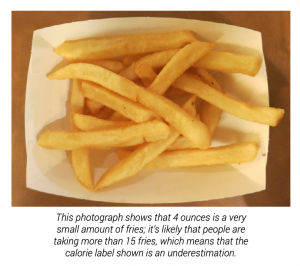Keywords: Behavioral economics, behavioral design, health, wellness programs
The Challenge
Aetna, a health insurance company, wanted an objective way to evaluate how a company’s workplaces helped – or hurt – an employees health. They understood that we spend a large percentage of our day at work and that the employer (Aetna’s client) has an opportunity to proactively design its workplace to empower employees to make healthy choices. Their goal was to help employers by providing them with low-cost, proven recommendations to improve the health of employees.
Process
In partnership with Aetna, Irrational Labs did a rigorous evaluation of the cafeterias, offices and gyms of three large companies. The specific companies were chosen as they were representative of a typical workplace setting as well as an employer’s well-being programs.
Example insights:
- Pull vs. Push: In some companies the cafeteria servers asked employees if they wanted extra sauce or fries. These types of prompts reduce the friction to consuming additional calories. And, it subtly implies that getting fries is the norm. Ideally these items are available, but on request.

- Avoid self-serve options when possible: Portion control is critical to weight management. The key to portion control is having less on our plate. However, most cafeterias have a mix of self-serve food and food that is served by the staff. When serving ourselves, we may not be aware or conscious of serving size. A food staff member, who is trained, will be better able to avoid scoping unintentional big portions.
- Make the healthy options the easy options & remove friction: During the workday, people are solving for speed in between meetings. Currently, grab and go chips tend to be the most salient option for people in a hurry. In one large cafeteria, they had 6 spots dedicated to chips! There is an opportunity to create a “fast check-out lane” dedicated to just-go salads. By decreasing wait time for healthy options relative to other options, we give people an additional reason to reduce calories. The healthy choice should have the least amount of obstacles associated with it!

Based on this evaluation and our deep expertise in behavioral science insights, we created rigorous standardized evaluation criteria to measure how well a company’s programs, resources, and environment are designed to facilitate employee health.
The 100-point checklist evaluated a companies’ health provisions, fitness centers, cafeterias, and general setup. Each item on the checklist was assigned a point value based on how much it could impact an employees’ health, and included an explanation so employers can understand why it’s important.
The Irrational Labs team then spent a full day training Aetna’s sales and relationship management staff on the health evaluation criteria.
Results
The checklist was successfully rolled out to all of Aetna’s clients via their relationship managers. It acted as a standard measure to evaluate health initiatives related to health clinics, fitness centers, and cafeterias.
